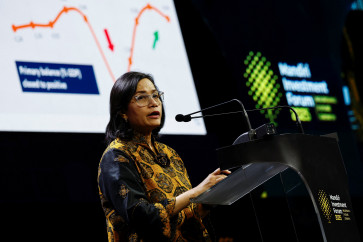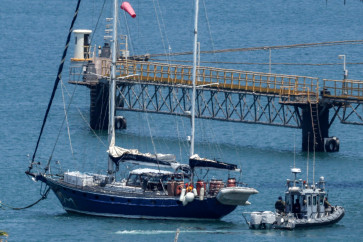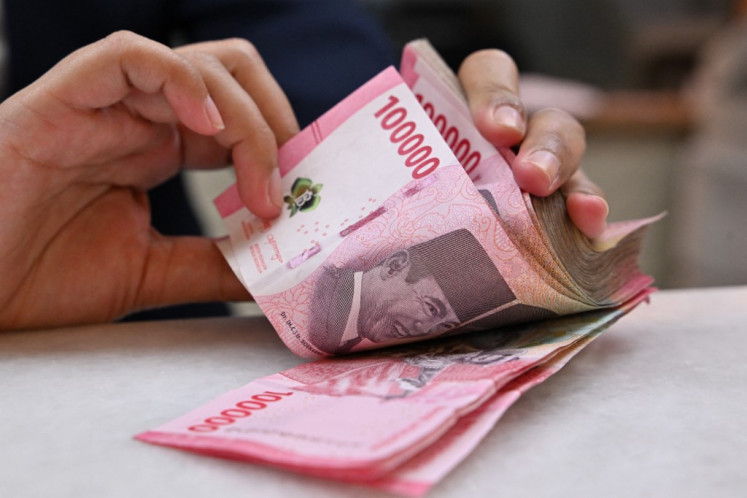Popular Reads
Top Results
Can't find what you're looking for?
View all search resultsPopular Reads
Top Results
Can't find what you're looking for?
View all search resultsJakarta plans to ban some groundwater extraction. Not so fast, experts say
Change text size
Gift Premium Articles
to Anyone
T
he Jakarta administration is considering a plan to restrict groundwater use to prevent the capital city from sinking further, but experts say the administration needs to provide equitable water access to the population before enacting such a policy.
The plan has highlighted a major challenge that policymakers face in a city where households and business have been extracting groundwater independently of the municipal water system for years, causing land to subside as the city struggles to expand its tap water services.
Jakarta Water Resources Agency head Yusmada Faisal said the provincial administration was preparing a regulation to restrict groundwater extraction in parts of the city that were already covered by tap water services.
“We are formulating [a regulation] to prohibit groundwater extraction for areas that are already covered by tap water service,” Yusmada said on Oct. 5, as quoted by Antaranews.com.
The plan was announced after Public Works and Housing Ministry director general for human settlements Diana Kusumastuti urged Jakartans on Oct. 4 to stop extracting groundwater in a bid to halt land subsidence in the city.
The ministry is currently constructing regional drinking water supply system (SPAM) Jatiluhur 1 in West Java and Karian Serpong in Banten to bring more tap water to the city. They are set to begin operation in 2024, Diana added, as reported by Antaranews.com.
As of October 2020, 65 percent of city residents were covered by Jakarta-owned tap water company PAM Jaya. The company hopes to increase its coverage to 100 percent by 2030.
Jakarta Deputy Governor Ahmad Riza Patria said that once this 100 percent coverage had been reached, the administration would fine buildings and enterprises that extracted groundwater.
“Our hope is that no one in Jakarta extracts groundwater in the future,” said Ahmad as quoted by Kompas.com. “We will fine industries, hotels, apartments, offices or malls that use groundwater.”
The sinking of Jakarta
If Jakarta’s groundwater extraction, which is widely blamed for its land subsidence, continues, the city will face an increased threat of sinking below sea level, according to several studies.
Read also: Jakarta is sinking fast: Experts
A recent model by the Bandung Institute of Technology (ITB) geodesy research division suggests that about 9,000 hectares, or roughly 14 percent of Jakarta’s land area, is currently below sea level, although seawalls and river embankments have largely prevented seawater from entering these areas.
If left unchecked, up to 28 percent of the city could sink below sea level by 2050 because of land subsidence and rising sea levels, with some areas of the city sinking as much as 4 meters. The current rate of land subsidence, according to ITB’s modelling, is between 1 and 10 centimeters per year.
Meanwhile, a report by the National Institute of Aeronautics and Space (LAPAN) based on satellite imaging revealed that between 2015 to 2020, land in Jakarta was sinking at a rate of 0.1 cm to up to 8 cm per year on average.
ITB geologist Heri Andreas said that while groundwater extraction was the main contributor to Jakarta’s land subsidence, other factors also contributed to the issue, such as Jakarta’s soft alluvial soil, especially near its coasts, and the prevalence of heavy, high-rise buildings throughout the city.
No silver bullet
While recognizing that Jakarta needs to reduce its groundwater consumption, experts and activists have said that the city administration should also work to ensure that it provides equitable water access to its population.
“If groundwater extraction were immediately stopped, the residents would ask [the Jakarta administration] where they could get water,” said Heri.
Separately, National Research and Innovation Agency (BRIN) geologist Robert Delinom said that the Jakarta administration should also consider other measures to halt land subsidence, such as by limiting the construction of large buildings, particularly along the city’s northern coast, and increasing water catchment areas to gather more rainwater and eventually improve groundwater levels.
People's Coalition for the Right to Water (KRuHA) national coordinator Muhammad Reza said that while stopping groundwater extraction could contribute to stopping land subsidence in Jakarta, it should not come at the cost of clean water access in the city.
“Stopping groundwater extraction will not be useful [for stopping land subsidence] without a full overhaul of water management above ground,” Reza said.










